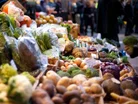WWF: UK Supermarkets are Lagging Behind on Emissions

WWF’s latest 'What’s in Store for the Planet 2024' report delivers a sobering assessment of UK supermarkets’ progress towards halving the environmental impact of the average weekly shop by 2030.
Despite improvements in data transparency, most supermarkets are “way off track” to meet urgent 2025 goals, including securing deforestation-free supply chains for soy, beef, cocoa and palm oil.
The report critiques the slow pace of change across seven key areas, highlighting the substantial risks to climate and biodiversity if the sector doesn’t act decisively. In particular, food production, which accounts for 40% of habitable land use and a quarter of global greenhouse gas emissions, is under scrutiny. WWF stresses that unsustainable practices not only harm the planet but also threaten food security, leading to rising costs and shortages.
A shocking statistic emphasises the urgency; since the WWF Basket initiative launched in 2021, 7.9 million hectares of tree cover—an area the size of Austria—has been lost globally.
Scope 3 emissions and deforestation: The biggest hurdles
The report also features Scope 3 emissions, which encompass all indirect emissions within a company’s value chain, such as those produced by farms supplying supermarkets. These emissions remain poorly monitored and vastly underestimated, casting doubt on whether retailers can meet their 2030 science-based climate targets.
One of the most concerning findings relates to soy, used mainly as animal feed. Only 4.5% of soy entering the UK retail chain is verified as deforestation-free, while cocoa fares even worse at 0.3%. Without robust systems to trace and verify supply chains, products like beef and palm oil continue to drive deforestation and biodiversity loss, undermining climate action.
The WWF report also identifies worrying trends in diets, with supermarkets selling double the target proportion of livestock protein and food waste levels increasing across retail and manufacturing.
WWF warns that “irresponsible palm oil production,” widely used in everything from processed foods to cosmetics, remains a major driver of deforestation. This failure threatens tropical forests vital for carbon absorption and biodiversity.
“Supermarkets have a crucial to play in the sustainability of our food system and therefore the climate, but they are falling short of their climate and nature targets and missing them isn’t just bad for business – it’s a recipe for disaster," adds Sir Dave Lewis, Chair of Trustees at WWF.
"If supermarkets fail to act now, the impacts of environmental crises will only worsen, with even more consequences for supply chains, prices and the ecosystems they rely on. With supply chains already on the brink and customers demanding change, it’s time for supermarkets to lead the charge toward a sustainable future.”
Signs of progress and the path ahead
Despite the grim overview, the report does highlight some positive steps. Several supermarkets have aligned their Scope 1 (direct emissions) and Scope 2 (energy-related emissions) targets with the Science-Based Targets initiative (SBTi). Encouragingly, more retailers are now setting Scope 3 targets aligned with SBTi’s Forestry, Land-use and Agriculture (FLAG) guidance.
Progress is also evident in the seafood sector, where four supermarkets now report on wild-caught species under the Seafood Jurisdictional Initiative. Certified sustainable seafood has risen to 88% of reported figures. Additionally, more than half of UK-sourced produce is now grown on farms adhering to soil health and biodiversity standards.
Transparency has also improved significantly, with 10 of 11 major retailers—representing 90% of the UK grocery market—sharing more data than ever before. This transparency is essential for tracking sustainability efforts and identifying areas requiring urgent action.
"Consumers should not have to worry about whether their food shop is fuelling the climate crisis or pushing precious wildlife closer to the brink," asserts Tanya Steele, CEO at WWF UK.
"How we produce food remains one of the biggest threats to our planet. And while it's positive that UK supermarkets have pledged to source their food responsibly, they must now follow through.
"Supermarkets depend on nature and a stable climate for the food they sell and most people want to buy sustainably."
Unless supermarkets prioritise this, we will all suffer the consequences.
The UK government must now step in and urgently introduce the long-awaited due diligence regulations to prevent further destruction of our forests and natural habitats.
Without them, supermarkets will continue to pay lip service while the planet pays the price for their inaction – putting us all at risk.
Accelerating change through collaboration
WWF calls for coordinated action across the sector to address these issues. Governments must enforce regulations, commodity traders must ensure supply chain traceability and supermarkets must empower consumers to make sustainable choices.
The report urges supermarkets to:
- Invest in robust monitoring systems for high-risk sourcing locations.
- Stop sourcing from traders without credible deforestation-free action plans.
- Promote plant-based alternatives to reduce the environmental impact of meat production.
WWF emphasises that these measures are not just necessary but non-negotiable for a sustainable food system. Collaboration is key and supermarkets must share solutions and best practices to achieve these goals together.
While challenges abound, the report’s findings underscore the importance of determination and innovation in overcoming them.
Make sure you check out the latest industry news and insights at Scope 3 Magazine and be part of the conversation at our global conference series, Sustainability LIVE and Procurement & Supply Chain LIVE.
Discover all our upcoming events and secure your tickets today. Subscribe to the Scope 3 Magazine newsletter.
Scope 3 Magazine is a BizClik brand.
Featured Articles
Estonia, Latvia and Lithuania join the European grid, cutting ties with Russian energy, a move that boosts regional security and sustainability
TÜV SÜD: New battery regulations bring Scope 3 hurdles, requiring sustainable sourcing, digital traceability and design changes increasing compliance
Nissan is scaling up its use of green steel, reducing CO2 emissions in its supply chain as part of its goal to achieve carbon neutrality by 2050

